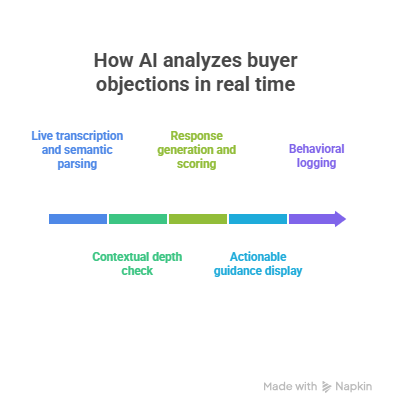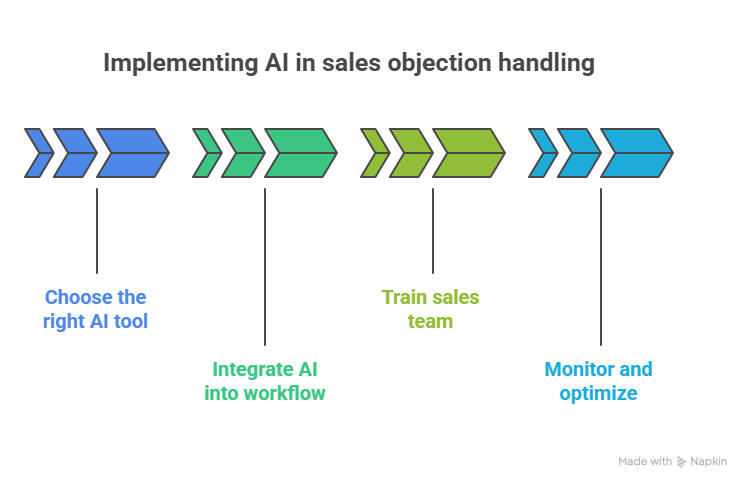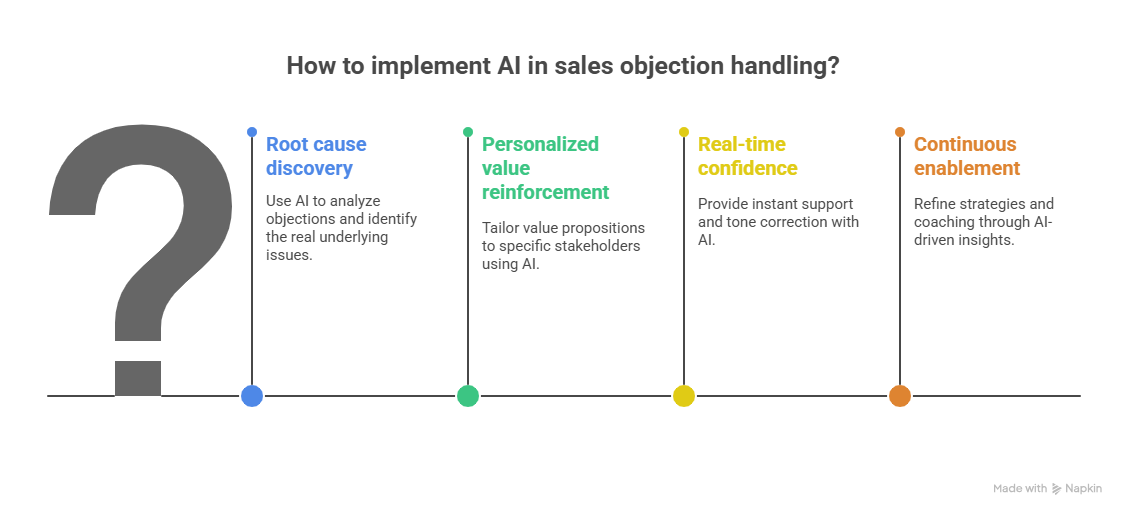Handling sales objections with AI is the key to turning tough buyer challenges into sales opportunities. Instead of seeing objections as roadblocks, AI empowers teams with real-time insights to respond smarter and close deals faster. This guide reveals how to master objections using intelligent, data-driven support.
Understanding AI in Sales Objection Handling
What is AI Sales Objection Handling?
AI sales objection handling leverages sophisticated Artificial Intelligence, specifically Natural Language Processing (NLP) and Machine Learning (ML), to analyze live conversations and immediately suggest contextually perfect responses.
How it fits into modern sales workflows
Integrating AI objection handling directly into your CRM and communication tools-like your dialer or video conferencing software-means reps will always have a virtual coach by their side. Research shows that AI tools can save sales professionals more than two hours of work daily by automating manual tasks, freeing them up to focus on high-value selling activities like expertly handling sales objections. This means coaching, strategizing, and less time searching for the right slide deck.
The Real Power of AI in Sales Conversations
AI can analyze real-time conversations, understand buyer sentiments, and provide contextual responses that resonate with the potential client’s concerns. With AI, the tedious task of manually sifting through data is eliminated, allowing sales reps to focus on high-value interactions.
How AI Understands Buyer Intent
Active listening applied with state-of-the-art NLP means that AI listens by breaking down speech into phonetic units, thereby analyzing word choice, pacing, and hesitation to identify what the root cause of the objection may be. For example, when the prospect says, "It sounds expensive," the AI doesn't just register the word "expensive." It analyzes:
- Sentiment: Is the tone frustrated, curious, or dismissive?
- Context: Was this said right after you mentioned the annual contract, or at the value proposition summary?
This nuanced understanding ensures that as you handle sales objections with AI, the proposed response addresses the actual problem and not just the comment itself.
Real-Time Sentiment Analysis & Smart Suggestions
The AI listens to the tone and words of the conversation in real time to understand how the prospect feels, whether they sound interested, unsure, or frustrated. If it detects a negative reaction, the AI instantly suggests responses that show empathy and help clear confusion. This quick and thoughtful response helps sales teams handle objections better, leading to a 15–20% increase in win rates on tough deals.
Turning Objections into Opportunities with Predictive Insights
AI utilizes data from thousands of past sales conversations to predict the response most likely to be effective in each situation. It studies details like the prospect’s industry, company size, and past interactions to give the best possible suggestion. This helps sales reps handle objections confidently and close deals faster because the AI already knows which approach is most likely to succeed.
How AI Analyzes Buyer Objections in Real Time
Analysis for effective AI sales objection handling happens fast, is multi-layered, and is done as the conversation unfolds:

- Live Transcription & Semantic Parsing: The AI tool constantly listens while translating speech to text and then parsing that text for semantic meaning and specific objection triggers.
- Contextual Depth Check: The system instantly checks internal databases matching the type of objection to successful outcomes for this particular vertical or buyer persona.
- Response Generation and Scoring: The AI generates a set of possible rebuttals, then scores them based on their previous outcomes internally.
- Actionable Guidance Display: The best-ranked, most relevant recommendation is delivered to the salesperson through an unobtrusive interface, a "whisper" or pop-up within milliseconds, enabling them to respond to the sale objection immediately.
- Behavioral Logging: The system logs which suggested response was used, along with the subsequent prospect reaction, to make sure the model is continually refined for the next time someone needs to handle sales objections using AI.
Real-Time Sales Coaching AI: The Game-Changer
Real-time sales coaching AI moves beyond mere suggestion; it's designed to teach while the representative is selling. It flags deviations from a winning sales methodology-perhaps the rep spoke too much, used weak closing language, or failed to probe deeper after an objection was raised. This constant, immediate feedback loop accelerates learning, builds unshakeable confidence, and empowers reps to use handling objections in sales techniques flawlessly, even when facing complex, multi-layered concerns.
How to Implement AI in Sales Objection Handling?
Successfully bringing in effective AI sales objection handling requires thoughtful integration:

Step 1: Choose the right AI tool: select a platform that specializes in real-time coaching and analysis rather than post-call reporting only. Be sure it can also ingest and use your company's own competitive intelligence and past win/loss data.
Step 2: Integrate AI into Your Sales Workflow: First, the AI should feed suggestions right onto the rep's screen during the live interaction. Poor integration causes distraction, which defeats the purpose of immediate guidance on the handling of objections to sales.
Step 3: Train Your Sales Team (the Buy-In Phase): The training needs to focus on trusting the data the AI brings. Reps need to view the AI as an extension of their best colleague, not its replacement. In fact, this is also important in the organic adoption of handling sales objections with AI.
Step 4: Monitor and Optimize (closing the loop): Don't just use the AI for suggestions; analyze its trend reports. When the AI indicates 40% of your deals stall on the "Timing" objection, you'll know exactly where to focus management coaching and marketing content creation.
Common Sales Objections and AI-Powered Responses
AI does an excellent job at generating structured answers for classic blockers:
How AI Enhances Objection Handling Techniques in B2B Sales
AI turns objection handling in sales from an after-the-fact skill into a proactive, data-validated process. In complex B2B sales, AI sales objection handling helps reps uncover actual concerns, build messaging to different stakeholders, and keep control of every conversation.

1. Root Cause Discovery – Finding the Real Objection
In B2B, the first objection is seldom the real one. AI objection handling uses:
- Semantic Analysis: It analyzes full conversations across calls, emails, and chats to understand the underlying concerns. Example: "I need to think about it" may be a hidden timeline or change-management issue.
- Contextual Linking: AI links the objection to the buyer's journey-previous web visits, email interactions, or competitor mentions-to help reps handle sales objections with AI using full context.
2. Personalized Value Reinforcement – Tailoring to Stakeholders
B2B buying decisions involve multiple roles, and sales objection handling AI makes sure each of them gets a relevant message:
- Stakeholder-specific social proof: AI surfaces ROI-based case studies for financial buyers and integration or performance testimonials for technical buyers.
- Predictive ROI & Financial Justification: AI tools instantly calculate potential return on investment, enabling reps to move from price defense to the demonstration of value. Examples include, "Our solution can recover $X,000 annually."
- Tiered Pricing Strategy Guidance: AI recommends the right pricing tier based on budget and intent, preventing over- or underselling, thus enabling efficient objection handling in sales.
3. Real-Time Confidence and Conversational Flow – Instant Support
AI sales objection systems act as co-pilots during live meetings.
- Live Objection Alerts: AI picks up on tone or language signaling objections like "Competition Detected" and immediately whispers proven counterpoints or differentiating questions.
- Sentiment-Driven Tone Correction: Whenever the prospects sound skeptical or tense, AI cues the rep to show empathy or pause, hence making this handling of sales objections with AI smooth and credible.
4. Continuous Enablement and Strategy Refinement – Learning at Scale
The insights from objection handling in sales power team-wide improvement:
- Objection Trend Reporting: AI consolidates objection data on an industry, stage, or territory basis, enabling leaders to identify 'blocking' issues.
- Targeted Coaching & Simulated Training: Reps get to practice in AI-driven simulations, getting instant feedback on tone, language, and pacing. This greatly improves their handling sales objections performance.
- Cross-team Intelligence Sharing: AI insights are used by marketing and product teams to refine messaging, pricing, and features for future deals.
It brings together contextual understanding, personalization, and predictive insights to help B2B sales teams overcome complex challenges, accelerate decisions, and close high-value deals faster.
Why do most sales teams struggle to handle objections?
The inability to handle sales objections effectively often arises out of some fundamental process gaps, which AI is uniquely positioned to fix:
Lack of context creates mismatched responses
Because reps have no immediate, granular data on the prospect's industry, budget history, or specific priorities, they'll answer in generic terms. AI solves this by providing context-aware insight: it knows whom you are speaking to.
One-size-fits-all responses that miss the mark
Relying on static battle cards stifles natural conversation flow and makes reps sound robotic. AI sales objections tools dynamically adjust tone and language to match the prospect's style, ensuring relevance.
Reactive instead of proactive objection management
The stress of an objection pushes a rep into reactive mode, broadcasting uncertainty. AI wipes that away by making preparation instantaneous-a safety net, of sorts-so the rep can remain proactive and in control throughout the handling of objections in the sales process.
Why AI in Sales Objection Handling is Essential for Your Sales Team
AI in sales objection handling is important because it scales expertise and consistency to drive measurable uplift.
- Faster Response Times: AI cuts down negotiation time. Efficiency in this respect is reflected by data showing that AI users experience 40% faster sales cycles.
- Personalized Approach: Since every suggestion is crafted based on the unique profile of the prospect and real-time input, the interaction is deeply respectful and relevant.
- Scalability: It ensures consistent, highly effective objection handling across the entire organization, with new hires ramping up faster and the most experienced reps continuing at peak performance.
How does Pepsales AI change how you handle objections in sales calls?
Pepsales AI operates as a co-pilot in real-time and makes every response a data-backed decision rather than a guess. Objection handling will be transformed across three key areas:
1. Real-Time Detection and Contextual Guidance (The “When” and “What”)
Pepsales AI listens in real-time to conversations, instantly identifying and flagging objections through tone and keyword analysis. It even categorizes them. Price, Timing, Authority, Need, and reveals the root cause, such as a "Lack of ROI Clarity." The system then surfaces contextual, data-validated responses that have proved successful on similar deals and are customized to the buyer persona and deal stage.
2. Eliminating Guesswork with Proven Conversion Language (The “How”)
Instead of generic scripts, Pepsales AI provides evidence-based rebuttals drawn from past successful calls. It aligns responses with your sales methodology MEDDPICC, BANT, etc, and provides tone or pacing feedback like "slow down" or "add empathy." Confidence and natural conversational tone guaranteed.
3. Manager Coaching and Continuous Improvement (The “Why”)
Pepsales AI aggregates objection data to show common deal blockers, top-performing reps, and territory trends. Managers get call summaries with objection moments pinpointed for precise coaching. This insight helps marketing and product teams tighten messaging, pricing, and features-and makes every objection an opportunity for growth.
Conclusion
AI-driven tools are not just optimizing; they are revolutionizing how sales teams approach objections, making it significantly easier to respond in real-time with precise, data-backed information. Indeed, the integration of sales objection handling AI is no longer an enhancement but a core necessity for any sales organization committed to maintaining a competitive advantage and maximizing revenue yield.
Ready to turn every hesitation into a strategic advantage? See how Pepsales AI can elevate your objection-handling strategy today!
FAQs
- How is AI being used in sales?
AI automates repetitive administrative tasks, allowing reps to focus on selling. It also powers predictive lead scoring and uses conversation intelligence to analyze calls. This leads to highly personalized outreach and better decision-making for closing deals faster.
- What are the 4 P's of objection handling?
The 4 P's is a structured approach: Prepare (Anticipate objections), Probe (Ask questions to find the root issue), Present (Deliver the value-based solution), and Proceed (Confirm resolution and set the next step).
- What are the 3 F's for handling objections?
The 3 F's is an empathy-based technique: Feel (Acknowledge the prospect's emotion), Felt (Share that others felt the same way), and Found (State the positive outcome that was found after moving forward).
- What are the 4 types of objections in sales?
Nearly all sales objections boil down to four core areas: Lack of Need (don't see value), Lack of Urgency (timing is wrong), Lack of Trust (credibility issue), or Lack of Money (budget constraints).










.avif)
.avif)
